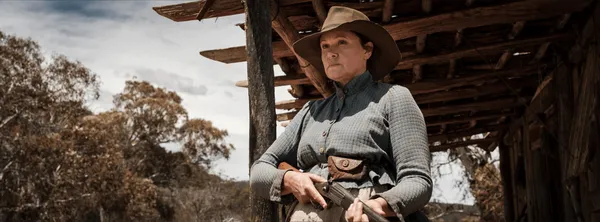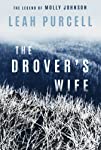Eye For Film >> Movies >> The Drover’s Wife: The Legend Of Molly Johnson (2021) Film Review
The Drover’s Wife: The Legend Of Molly Johnson
Reviewed by: Jennie Kermode

Life out in the Australian bush is hard today, but in the late 19th Century, before modern forms of power generation and communication were available, it required people to be completely self-reliant. The notion that tough men looked after vulnerable women and children was a myth. Women had to be every bit as independent. Molly Johnson (played by writer/director Leah Purcell) is used to taking care of her family whilst her husband is away droving sheep in the hills. When we first meet her, as she warily welcomes two strangers who turn out to be the new lawman and his wife (Sam Reid and Jessica De Gouw), her children declare proudly that she has just killed a bullock which strayed onto their land - an act which would have required a lot of nerve. In exchange for a beef dinner, the couple agree to take her children into the local town for schooling. She doesn't know, at that point, that there's a very real danger of her never seeing those children again.
Molly's life is changed forever by an encounter with an Aboriginal man, Yadaka (Rob Collins), who arrives on her land wounded and in need of refuge. Once again, she's wary, but she's impressed by his manner and the two eventually arrive at a deal: first aid, food and refuge in exchange for work. He proves reliable and stays for a few days, forming a strong bond with her remaining son, but it's what he says when the time comes for him to leave that shocks her and puts a decision she has already made in a different light. Now she can no longer count on others' sympathy and must use all her wit and fortitude to try and get her family back together.
Purcell, who has a strong personal connection to the character, makes a commanding lead. There's good supporting work all round and although the film only uses a few locations we get a strong sense of how the landscape has shaped the different people within it. Occasional views from a distance are glorious but for much of the running time the perspective is more claustrophobic, with white characters bound to their homesteads, wary of straying far. Everybody's life is constrained in one way or another, and those most tightly bound by their own fears respond by seeking to impose restrictions on others.
As Molly and Yadaka come to understand one another, the film tackles Australia's racist legacy head on, from white settlers' attempts to control land to the politicking behind the Stolen Generation, and the underlying connection between land and bodies that this reveals. An opening shot of Molly sweeping the ground in front of her house, a seemingly pointless exercise in a place full of blowing dust, takes on new resonance later in the film when we learn that her first born is buried under it. Yadaka explains that his people have already left to escape the coming snow. For everyone left behind, life can only get harder.
The film also explores the impact of misogyny, often taken for granted or ignored in films set in the past, and it's particularly astute in its handling of experiences where the effects of one type of prejudice are compounded by another. Tensions arise in the newcomers' marriage as the lawman comes to understand that his wife doesn't just want to write about the ill-treatment of women, she wants to fight it; yet when she tries to assert herself on Molly's behalf, she is brought up sharp, made aware of the limits of her understanding. The film itself as an invitation to listen to voices too rarely heard. Like other iconic figures confronted with injustice, Molly seems to grow in stature with every slight, to gain spiritual power as she loses worldly power.
The legend, such as it is, derives from a short story written by Henry Lawson in 1892. It's a simple tale with none of the complex plotting to be found ere, but it establishes a character who has loomed large in the Australian imaginary ever since and whom Purcell loved from childhood, gradually expanding and substantiating her by way of a play and a book. With a TV series now in the works, this is a story that won't g away; one with something potent to say about what it means to be Australian. One can easily imagine that, a hundred years from now, people will believe she was real. She's a gestalt born out of many women's experiences, but with this stunningly photographed western, Purcell has given her life.
Reviewed on: 19 Mar 2021

















